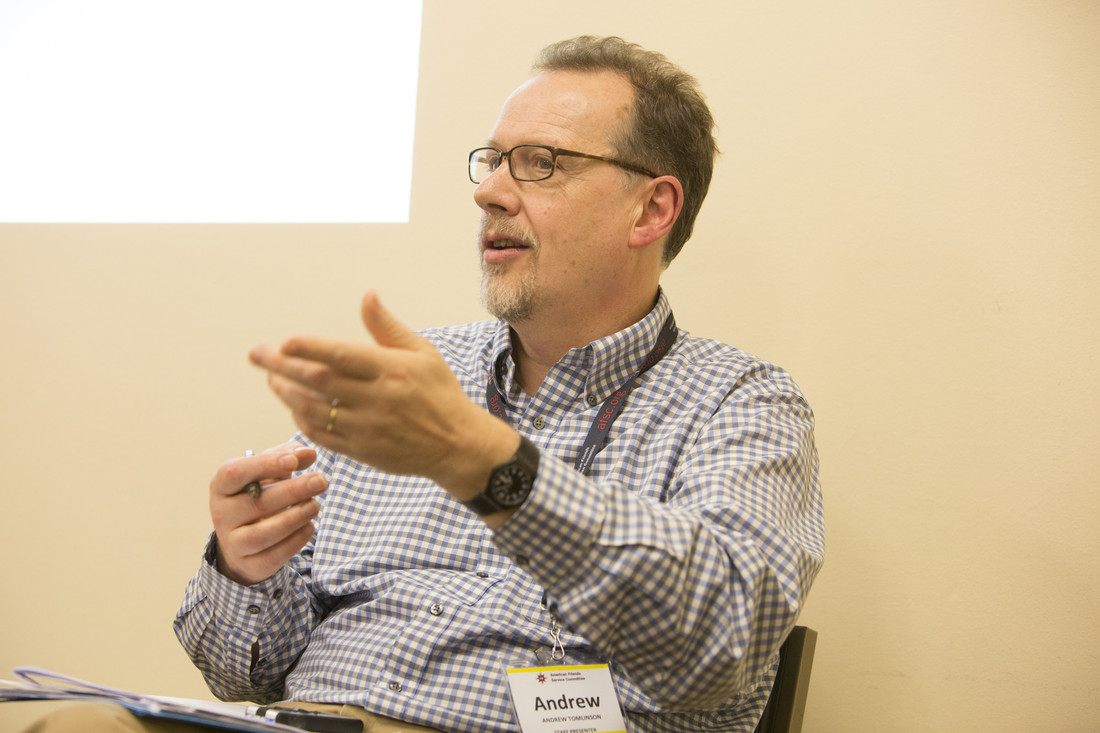
Drop here! James Wasserman
Q: Tell us about the history of QUNO.
A: In 1945, in the final months of the most destructive conflict the world has known, world leaders came together in San Francisco to sign the Charter of the United Nations, stating as their purpose “to save succeeding generations from the scourge of war, which twice in our lifetime has brought untold sorrow to mankind.” Friends participated in the San Francisco conference, and two years later, in 1947, the same year as Quakers were awarded the Nobel Peace Prize, the Quaker United Nations Offices in New York and Geneva were established. Seventy-five years later, QUNO continues to flourish as a shared initiative of the global Quaker community, and receives critical administrative and financial support from AFSC.
Q: Why is it important for Quakers to be at the U.N.?
A: Today, the problems facing the world are more fearsome than ever, and it’s never been more clear that we need global cooperation on all kinds of issues. The U.N. does three important things: First, it’s a forum where global norms on peace are debated and formalized—including on issues like migration, climate change, and building sustainable peace. Second, it’s a place where the world comes together to seek common ground on issues of peace and security—particularly in responding to crises. Third, the U.N. itself is an important actor in most, if not all, countries affected by conflict and fragility. Historically, Quakers have also seen the U.N. as a place where they can have an outsized impact. If you can influence the development of global standards on peace that affect the policies of governments, aid agencies, and financial institutions around the world, then you can have an impact much larger than would be possible at a community or national level alone. The key is to link the big policy discussions with the experience and insights of local communities, and this is where the partnership between QUNO, AFSC, and other Quaker organizations can be so effective.
Q: How does QUNO influence international standards and practice related to peace?
A : Our staff works directly with diplomats, U.N. officials, and nongovernmental organizations to achieve change. That work is based on Quaker-rooted values and ways of working, with an emphasis on facilitating relationships, convening spaces for stakeholders to deal with differences through dialogue, integrating the voices of those with lived experience of peace and conflict, and lending support and encouragement to people working at the U.N. to enact policies and practices that actively build peace and address conflicts nonviolently. We also maintain Quaker House near the U.N., providing a place where diplomats, staff, and partners can meet to discuss issues in a quiet, off-the-record atmosphere.
Q: Can you give an example of the impact QUNO has had?
A: One recent example was the creation of the U.N. Sustainable Development Goals (SDGs), a blueprint for achieving a more sustainable future for all. Its predecessor, the Millennium Development Goals, addressed important issues like poverty, health, and education, but it soon became clear that those goals were not taking hold in countries that were poorer or affected by conflict. That’s because those previous goals didn’t address key drivers of peace–including issues such as inclusion, human dignity, and good governance.
For the SDGs, QUNO worked hard to ensure peacebuilding perspectives were enshrined in the new development framework, building on the yearning for peace that clearly emerged from the U.N.-led consultations that involved thousands of people from all over the world, and acting as a catalyst in mobilizing support for an agenda based on peace, justice, and inclusion. As a result, one of the 17 goals that all countries (including the U.S.) have agreed on for 2030 is Goal 16–the Peace Goal–which is focused on peace, inclusion, justice for all, and effective and accountable institutions. This is consistent with the vision QUNO works to advance at the U.N. – taking a long-term approach to ending and preventing conflict, addressing its root causes, and engaging a range of stakeholders in promoting sustainable and people-centered strategies for peace.